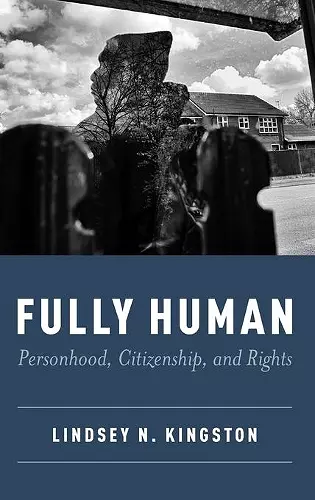Fully Human
Personhood, Citizenship, and Rights
Format:Hardback
Publisher:Oxford University Press Inc
Published:2nd May '19
Currently unavailable, and unfortunately no date known when it will be back
This hardback is available in another edition too:
- Paperback£24.99(9780197674840)

Citizenship within our current international system signifies being fully human, or being worthy of fundamental human rights. For some vulnerable groups, however, this form of political membership is limited or missing entirely, and they face human rights challenges despite a prevalence of international human rights law. These protection gaps are central to hierarchies of personhood, or inequalities that render some people more "worthy" than others for protections and political membership. As a remedy, Lindsey N. Kingston proposes the ideal of "functioning citizenship," which requires an active and mutually-beneficial relationship between the state and the individual and necessitates the opening of political space for those who cannot be neatly categorized. It signifies membership in a political community, in which citizens support their government while enjoying the protections and services associated with their privileged legal status. At the same time, an inclusive understanding of functioning citizenship also acknowledges that political membership cannot always be limited by the borders of the state or proven with a passport. Fully Human builds its theory by looking at several hierarchies of personhood, from the stateless to the forcibly displaced, migrants, nomadic peoples, indigenous nations, and "second class" citizens in the United States. It challenges the binary between citizen and noncitizen, arguing that rights are routinely violated in the space between the two. By recognizing these realities, we uncover limitations built into our current international system--but also begin to envision a path toward the realization of human rights norms founded on universality and inalienability. The ideal of functioning citizenship acknowledges the persistent power of the state, yet it does not rely solely on traditional conceptions of citizenship that have proven too flawed and limited for securing true rights protection.
[E]xciting [and] intellectually innovative. * Rhoda Howard-Hassmann, Journal of Human Rights *
Kingston makes a valuable and important contribution to the emerging field of statelessness studies. It will not only be interesting for academics in the fields of law, political theory, international relations, sociology, anthropology, or history, but also for practitioners--activists, journalists, lawyers, or migration authorities--and, maybe most importantly, for individuals claiming full and functioning citizenship. * Barbara von Rütte, Statelessness & Citizenship Review *
Lindsey Kingston's Fully Human is remarkable both for its breadth of content and its depth of research. Fully Human gives us good reasons to consider the idea of functioning citizenship. What stands out in Fully Human is the blending of empirical evidence and academic theory to produce a motivation for humanitarian action - without didactic moralizing. For those who are interested in human and political rights practices, Fully Human is the right place to start. * Times Higher Education *
This thoughtful and wide-ranging book is an important addition to the literature on citizenship, statelessness, and belonging. It is also a valuable intervention into the increasingly fraught contestation over what states owe to 'outsiders.' Kingston's book and her development of the notion of 'functional citizenship' deserve attention from anyone eager to better understand one of the most egregious human rights challenges of our fraught times. * Jacqueline Bhabha, Professor of the Practice of Health and Human Rights, Harvard University *
While there is much written about the distinction between economic and forced migrants, the idea of 'functioning citizenship' is new. Kingston considers several groups which, for reasons of displacement, lack of integration, societal and historic racism and discrimination, cannot call upon the state for protection.In so doing, she draws together several categories of person that are often treated separatelyin international law and in the context of humanitarian protection. Kingston covers a staggering amount of intellectual territory and beautifully pulls together classical works on forced migration, indigenous rights, and liminality with emerging research on statelessness. This book represents an ambitious and original project and will be of great interest to students and scholars of migration, citizenship, and contemporary politics. * Brad K. Blitz, Professor of International Politics, Middlesex University *
Fully Human will be a key reference for anyone interested in the politics of citizenship or human rights. Kingston's conceptions of right to place and purpose, and her argument about hierarchies, provide a substantial and insightful contribution to the theorisation of personhood. This accessible, compelling, and timely book will no doubt make an important contribution to vitally important discussions around humanity and personhood. * Kelly Staples, author of Retheorising Statelessness: Towards a Background Theory of Membership *
- Winner of Winner of the International Studies Association Human Rights Best Book Award.
ISBN: 9780190918262
Dimensions: 236mm x 170mm x 31mm
Weight: 544g
312 pages